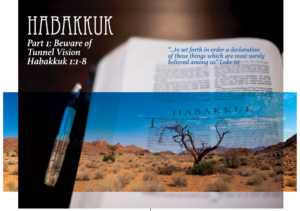In this first of a three part series, Warren Henderson takes us through the personal struggles that the prophet Habakkuk experienced in the life of faith – valuable lessons for believers in any age as they work through the problem of evil.
 A Burden to Be Lifted (1:1)
A Burden to Be Lifted (1:1)
Habakkuk referred to his received message as a massa, or “burden.” This Hebrew noun is derived from a verb which means “to lift up” (v. 1). The perplexed prophet lifted up weighty questions for the Lord to answer. Believers in the Church Age are invited to also lift up their burdens to the Lord: “Therefore humble yourselves under the mighty hand of God, that He may exalt you in due time, casting all your care upon Him, for He cares for you” (1 Pet. 5:6-7). Sincerely casting on to the Lord in prayer those things pressing down on our hearts is initially a laborious task, but ultimately results in abiding peace.
Prayer is work and believers must leave strength and time for effectual praying. The objective of prayer is not to shift our loads so that we can better shoulder them, that would be an exhausting waste of time, but rather to release our burdens to the Lord to deal with as only He can. But we must remember that groaning in prayer is not the same as grumbling or complaining to God about our difficulties (Rom. 8:22-27). The latter behavior reveals something lurking within us that inhibits praying in the Spirit (Eph. 6:18). The hindrance may be a rebellious spirit, doubt, or some level of distrust, or perhaps dissatisfaction with the Lord. We can escape these snares by candidly and genuinely lifting up our burdens to our caring Saviour.
“How Long” and “Why” Lord? (1:2-4)
The prophet lifted up to heaven what burdened his soul. His petition is framed by two sincere questions. The first question, “how long” in verse 1, refers to God’s apparent lack of response to his prayers. Why had God not brought relief to the righteous? How long was the Lord going to compel him to observe unchecked evil day after day?
The second question, “why” in verse 3, is used in connection to God’s apparent indifference to rampant plundering, violence, and strife in Judah. It is noteworthy that idolatry was not mentioned; no doubt a lasting benefit of the revival under Josiah. But overall, God’s covenant people were still carnal and prone to hostility and injustice. Why did the Lord tolerate such abuse and wrongdoing? Why did God seem disinterested in punishing His people for their evil doings? Habakkuk will repeat these same two questions during his second inquiry of the Lord (v. 13, 2:6). From the prophet’s perspective the Law had no sway on maintaining the morality of his countrymen and justice was completely sidelined by crooked rulers (v. 4).
Habakkuk probably felt as many Christians do today, it would be better to not see the deplorable state of the church, than to be constantly burdened by it and see no remedy for the worsening morality and lethargy. Some clearly see the unholy influences and the disdain of Christ’s name, but lack sincerity of heart to labor in prayer for what intimately concerns God. Others are unduly oppressed and disillusioned by the high tide of iniquity. Truly, nothing that man does can thwart the purposes of God so let us not be indifferent or disheartened by the surge of evil in our day. God is in control!
The Lord’s Answer (1:5-8)
Jehovah chose not to answer the prophet’s inquiries in the manner posed to Him. Indeed, a sovereign God need not explain His actions, but in this case God wanted to reveal what He was doing and about to do, so that later, His people would recognize His faithfulness to His word. The Lord’s response, a shocking message to the Southern Kingdom, was not the reply Habakkuk had expecting. The “you” in verse 5 is plural, meaning that Judah was to look, watch, and be utterly astounded: “Look among the nations and watch – be utterly astounded! For I will work a work in your days which you would not believe, though it were told you” (v. 5). The expression “in your days” indicates that what God was about to do would occur soon.
The Lord’s resolution to remedy the social injustice that Habakkuk had been complaining about would be so astounding, that it would seem unbelievable even after God told them in advance what He was about to do. Indeed, even godly Habakkuk was bewildered that God would chasten His people by such a wicked nation as Babylon (vv. 12, 17). Paul quotes verse 5 in Acts 13:41, but associates the baffling aspect of its meaning to what God had already accomplished through Christ at Calvary to resolve Israel’s sin and rebellion: “Look among the nations and watch – be utterly astounded! For I will work a work in your days which you would not believe, though it were told you.” Although God’s plan of salvation in Christ was prophesied, God did not divulge the details of His redemption plan until after Christ’s resurrection, otherwise the enemy would have not crucified Christ (1 Cor. 2:8-9). But later, in the Epistles, the apostles explain the astonishing work of redemption God accomplished by judging His own innocent Son in the place of condemned sinners! Just as Habakkuk was baffled by God’s plan of refining and delivering Israel through pagan Babylon, centuries later, Israel, a nation ensnared by legalism, would be confounded by the message of the cross. The idea of complete salvation offered to them in grace through Christ was unimaginable.
The Lord planned to use the Chaldeans, a ruthless and quick-acting people to punish Judah’s evil doings (v. 6). God’s chastening rod would be a terrible and dreadful people, who having a law and honor to themselves were not obliged to abide by any recognized international authority or etiquette (v. 7). The Babylonians would be barbaric, high on themselves, and do whatever they pleased. With vivid imagery, the Lord then describes the fury of Babylonian army (v. 8). Their warhorses would be swifter than leopards and fiercer than wolves; their cavalry, like eagles would suddenly swoop down on unsuspecting Judah (v. 8).
Overcoming Tunnel Vision
We might be tempted to think that only the devil could inflict such venomous injury upon God’s covenant people; yet, Jehovah is the One who instigates or permits all that unfolds against Israel. Despite our short-sighted perception of determining the worth and benefit of things, God is always working in all things to accomplish a greater good that will honor His name (Rom. 8:28)! Habakkuk suffered from tunnel vision, but as God widened his spiritual perspective, he was able to see through faith that God really did have the whole situation under control. Beloved, Christ is building His church and has wonderful plans for her. Until then, may those who see sin clearly be burdened to pray for a reviving work that would invigorate the church with holiness, devotion, and power. Let us not be complacent or give up, nor think that God is not doing what we think He should. He will do all that He promises to do and all that will add honor and glory to His name.
About Warren Henderson
 Warren Henderson is a full-time worker living in northeast Kansas. He is involved in writing, evangelism, and Bible teaching. Currently, he is pioneering a new assembly in Ottawa, Kansas.
Warren Henderson is a full-time worker living in northeast Kansas. He is involved in writing, evangelism, and Bible teaching. Currently, he is pioneering a new assembly in Ottawa, Kansas.

